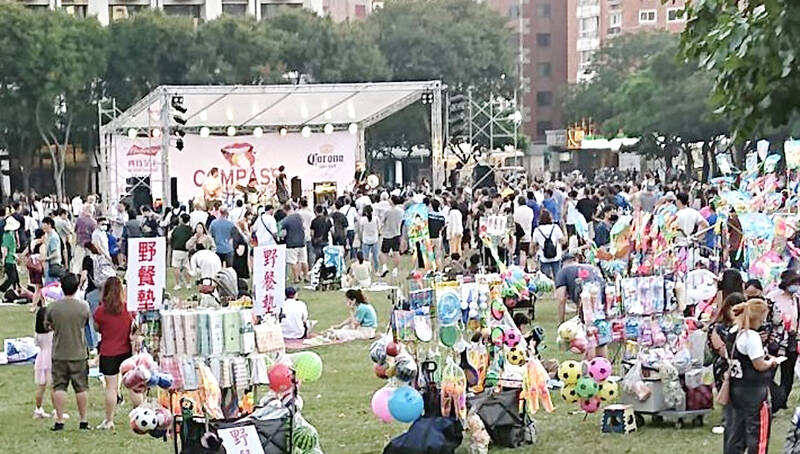Over a few beers before a recent rehearsal, bandmates joked that front man Shaun Armstrong of The ShapeMaster, might break a string on stage at this weekend’s Compass Taichung International Food and Music Festival.
“You get really pumped up,” said drummer Tim Tucker of ShapeMaster, a hard driving four-piece indie rock band from Taichung. “You get to unleash.”
ShapeMaster is scheduled to close out Saturday’s festivities with an hour-long set starting at 8pm.

Photo courtesy of Compass Magazine
The two-day bash, now in its 20th year, is expected to attract thousands to Civic Square, the city’s premier outdoor concert venue.
In addition to plenty of food and drink options, there’s a diverse musical lineup of about 20 bands, with genres ranging from jazz and hip-hop to country and modern rock.
Armstrong described Tucker as a technically gifted and animated drummer.

Photo courtesy of Kyle Merriman
“He’s known for stripping down and playing in his boxers,” he added.
What’s exciting, the band members say, is the rare opportunity to crank up the amps and play loudly in front of a lively crowd. Taichung, which used to enjoy a healthy live music scene, has had many of its large music venues close over the years.
“It’s one of my favorite shows of the year for that reason,” said Brahm Gawdan, who shares rhythm and lead guitar with Armstrong.
An earlier version of ShapeMaster, The Ever So Friendlies, first played the Compass festival back in 2009.
With Craig Sigmundson on bass, ShapeMaster has been part of the Taichung music scene for about a decade, releasing their single album “All the Shapes” last year.
“They’re very powerful,” said Courtney Donovan Smith, co-publisher of Compass Magazine, which organizes the annual festival. “Their music is rhythmic and danceable.” (Smith is also a columnist for the Taipei Times.)
And Saturday night’s crowd will certainly be grooving to one of ShapeMaster’s most popular songs, Fatal Dose. It’s all about having the devil on your shoulder and the temptations that ensue.
“It’s a pure rock ‘n’ roll song. Simple, slow and bluesy,” said Armstrong, who’s the band’s lead singer. The tight-knit group writes their music collectively with Armstrong usually adding the lyrics later on.
Known for liking a good metaphor, Armstrong turned a childhood memory of regret after running away from a confrontation into the fast-moving song Recordion.
“I’m generally not good at expressing myself unless I’m writing lyrics,” Armstrong said with a touch of humility.
And if the hard-strumming Englishman does break a string during the set, the band is ready, as it has been before.
“It’s called the Broken String Cavalry,” Armstrong said. “They have a couple songs ready and I’m their biggest fan. I get to hear them as I change my strings.”

June 2 to June 8 Taiwan’s woodcutters believe that if they see even one speck of red in their cooked rice, no matter how small, an accident is going to happen. Peng Chin-tian (彭錦田) swears that this has proven to be true at every stop during his decades-long career in the logging industry. Along with mining, timber harvesting was once considered the most dangerous profession in Taiwan. Not only were mishaps common during all stages of processing, it was difficult to transport the injured to get medical treatment. Many died during the arduous journey. Peng recounts some of his accidents in

What does the Taiwan People’s Party (TPP) in the Huang Kuo-chang (黃國昌) era stand for? What sets it apart from their allies, the Chinese Nationalist Party (KMT)? With some shifts in tone and emphasis, the KMT’s stances have not changed significantly since the late 2000s and the era of former president Ma Ying-jeou (馬英九). The Democratic Progressive Party’s (DPP) current platform formed in the mid-2010s under the guidance of Tsai Ing-wen (蔡英文), and current President William Lai (賴清德) campaigned on continuity. Though their ideological stances may be a bit stale, they have the advantage of being broadly understood by the voters.

Artifacts found at archeological sites in France and Spain along the Bay of Biscay shoreline show that humans have been crafting tools from whale bones since more than 20,000 years ago, illustrating anew the resourcefulness of prehistoric people. The tools, primarily hunting implements such as projectile points, were fashioned from the bones of at least five species of large whales, the researchers said. Bones from sperm whales were the most abundant, followed by fin whales, gray whales, right or bowhead whales — two species indistinguishable with the analytical method used in the study — and blue whales. With seafaring capabilities by humans

In a high-rise office building in Taipei’s government district, the primary agency for maintaining links to Thailand’s 108 Yunnan villages — which are home to a population of around 200,000 descendants of the Chinese Nationalist Party (KMT) armies stranded in Thailand following the Chinese Civil War — is the Overseas Community Affairs Council (OCAC). Established in China in 1926, the OCAC was born of a mandate to support Chinese education, culture and economic development in far flung Chinese diaspora communities, which, especially in southeast Asia, had underwritten the military insurgencies against the Qing Dynasty that led to the founding of